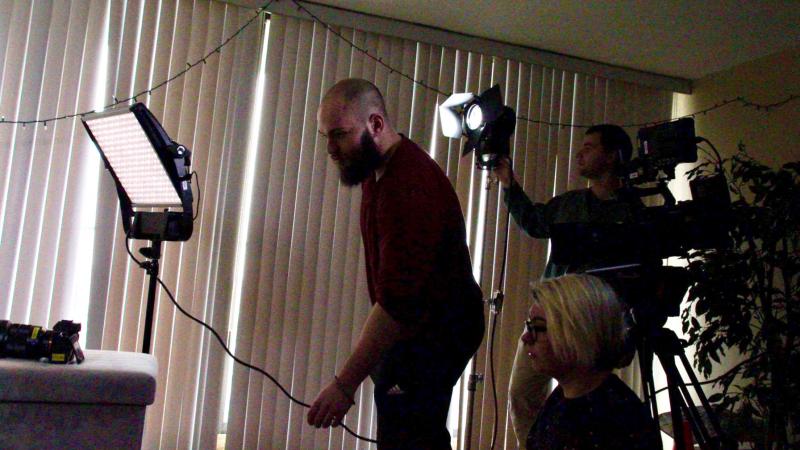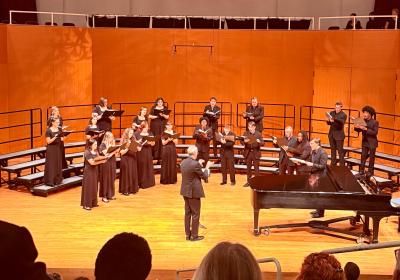
Virus Closes Curtain on Films
COVID-19 is not doing a lot of favors for people these days. Whether it is playing sports to learning in the classroom, everything seems to be going in a lot of different directions.
Cleveland State University made a decision in late March to move classes to online for the rest of the academic year, which impacted a lot of on-campus activities, including students in the film major.
The school of Film & Media Arts is one of the programs impacted greatly by the shutdown because a lot of students are filming their projects, and a lot of hands work on each one. Students have had projects halted, and canceled, while they wait for more on what will be happening.
Frederic Lahey, director of the school of Film and Media Arts, commented on what is being done with students, and how they will go about the rest of the semester and into the fall. He said that moving online has been smooth for the most part, but it has been frustrating for students, and yet they have found a way to be creative working from home.
"Of course we have film studies and writing courses that aren’t so bad in the remote setting, but spring is our big production semester and it has certainly been frustrating for the 200+ students who had planned to shoot during this time," he said. "Since the quality of every production is dependent on the level of preproduction preparation, we have been honing those skills. Some classes are shooting iPhone docs at home. Some are experimenting with Zoom productions."
He goes on to say, "A number of our students have been able to utilize the free postproduction software offered by Adobe and Avid. Few students have the 'horsepower' of our Mac labs for editing and effects, and many are making do with editing on their phones. Fortunately, an online consortium of film school instructors are sharing best practices on a Facebook site."
As students try to make the best with their work at home, they did receive some good news about what the future of their projects would be.
Lahey and his faculty have decided to let students use the equipment through summer semester and the first part of fall semester. He said they are committed in every way to give the students the opportunity to finish their films.
"We are committed to giving our students the opportunity to shoot and edit the films they intended for this shutdown period,” he said. "We are already seeing discussions of Hollywood methods for safe shooting and we have seen the shooting strategies and rules adopted by Australia, Sweden and Denmark who are the countries ramping up their production capacities."
"We have told students that when we are allowed to open," he continued, "we will let them check out the production equipment approved by their production faculty during the summer and fall until an Oct. 15 cutoff. We will also allow access to our editing labs and servers so long as they obey our social distancing and COVID-19 safety instructions. As the School of Film & Media Arts, we will, of course, be following directives from the university."
Freshmen through junior class students do not have to worry about graduation yet. But there are still some graduating film students who are waiting to see how this project would affect their grade.
Lahey said he would put those fears to rest, saying the school will not hold anyone back and will graduate everyone scheduled to graduate.
"We will not hold students hostage to the anomalies of our current situation,” he said. "We will examine the work and intent of our students and graduate them as they would have graduated were they not prevented from finishing their final projects. We expect that everyone who was expecting to graduate will graduate. Some have already asked if they can still finish their projects after they graduate. We will honor the commitment that we have made to all our students of the COVID era, and give them the access they need to complete their projects for a successful launch into the industry."
As summer courses are quickly approaching, Cleveland State has decided to put all the classes online up until the fall semester. With concern from students about how the spring and summer classes would interfere with one another, Lahey has said with the small number of classes in the school, it is not a big concern and that more decisions will have to be made as well.
"We don’t run many classes in the summer," he said. "Only a couple of online classes, internships and thesis projects. So it really doesn’t impact at all. Our Odyssey summer program for high school students was to start up this summer, but the decision on that program is still a few weeks out."
While there is still some time before the fall semester begins, Lahey said the school is beginning to look ahead to possible solutions if the semester happens to be remote as well. He said there are a lot of plans in place where some classes might be run in a hybrid style. But he also said this is a great time for the film students as well for the future.
“We have gotten approval from the Office of the Provost to cap our specialized classes that really need access to gear and facilities so that they will run small enough to allow for social distancing rules,” he said. “Meanwhile we will run our writing and film appreciation classes on a remote basis. We are also looking at running hybrid-style classes where portions of the classes will be online and half the class can come to the studios, say Tuesday, while the other half comes on Thursday for workshops."
"Rule #1 is do no harm and ensure the safety of students, staff and faculty," Lahey continued. "Rule #2 develop stories, plan productions, test, rehearse, collaborate, shoot and edit under university and industry guidelines until a vaccine is broadly available. This is a trying time for filmmakers, like it is for everybody else. But filmmakers are very good at creative problem-solving. This downtime is a great opportunity to deepen our characters, tighten our stories, develop our aesthetic language and focus on the essential for our future shoots."
Junior film student Andrew Sperhac was one of the students affected by the closure of the campus. He said that after he heard the news, a lot was going through his head, and he was nervous not knowing what to expect.
“Basically the day I found out I was really stressed,” he said. “The one thing that made me the most nervous was wondering if I would be able to complete my Production 3 film class, which I needed to graduate. I wasn’t sure what was going to happen because if I had to take the class again, I was on the verge of dropping out.”
As students try to make plans to work on their projects in the summer, Sperhac said that there is still some uncertainty if he can get his whole group back together. But he is all for working on the project in the summer.
“So our plan for our group is that we don't know,” he said. “Our film got half-way done shooting, and is canceled till the end of the semester, at least. I ideally would like to come back to finish the film with my group. If it happens to be in the summer in June or July, so be it.”
Sperhac, and company were working on their film called “Life of a Vegan Warrior,” when the stoppage happened. He said it was very upsetting to see all their hard work be put to the side.
“To see all our group's hard work (to) be taken down by this is very sad,” he said. “We were ready to do some editing after break. Which, of course we could not, and that was one thing that truly was a bummer, and not being able to work on the something that we all want to do in some way or somehow in the future.”
Hannah Park is also one of those students who has felt the effect of her film classes moving online. She feels Andrews' frustration, but understands what needed to be done.
“I think more than anything, I was frustrated,” she said. “It wasn’t announced until after campus officially closed that we wouldn’t be able to access our equipment, so there was still a little bit of hope that we’d get something done. Once they shut down campus and the number of Covid-19 cases started to rise, there was no way.”
Park was also one of the students who were in the middle of a film project when hearing the news about the shutdown. She was filling many roles during that time as she was a producer, first assistant director, and production designer in a number of different projects as well.
She has been in the film school since she has started on campus at Cleveland State. She said if she and her group are all not able to work on their projects until the summer, it will be devastating.
“Many of our productions are getting pushed back until the summer, but still nothing is certain with my group,” she said. "It’s a waiting game, but our director, Lahey, and the professors have been very honest with us in this whole situation. We had an entire course last semester to plan and prepare these films, so not being able to finish would be a devastating blow.”
Park’s professors have been providing available resource films for her and others to use at home. They were given to students like Park, who did not have final footage of film to edit on their projects. With those resources they were only allowed to use the equipment and people readily available in their homes to do any small assignment.
Park says it is great what the professors are doing to provide resources to continue the classes online. Some of the work is just hard for her to get enough motivation to do.
“I think the biggest challenge is finding motivation to get things done,” she said. One of the best parts of school is having a group like in film class to help support you. When you lose that, it's easy to lose steam and procrastinate.”




